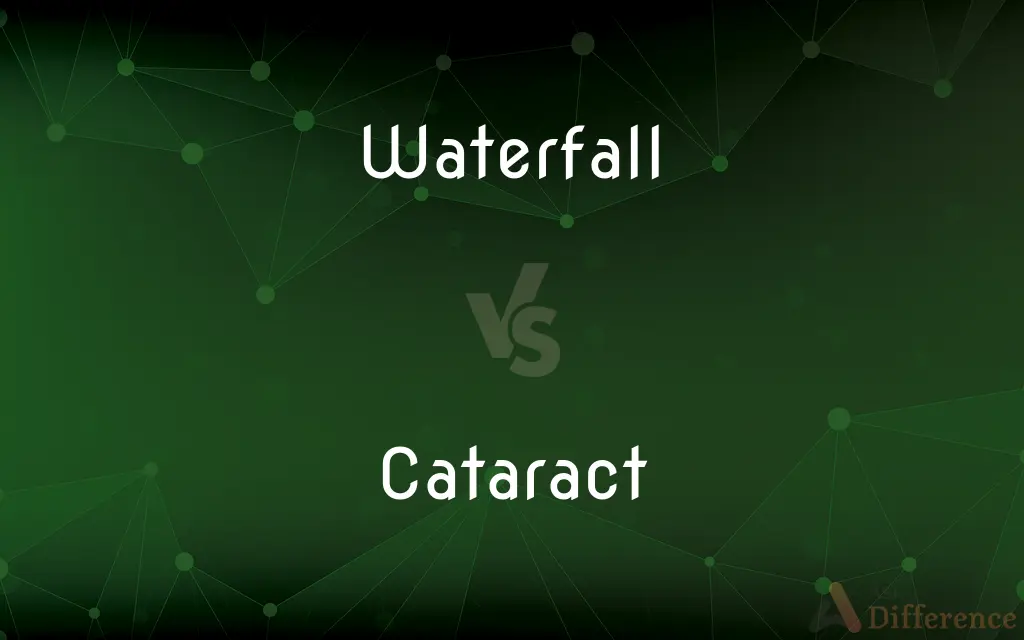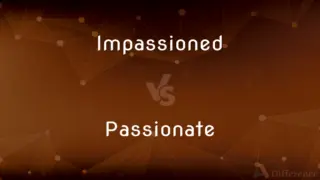Waterfall vs. Cataract — What's the Difference?
By Tayyaba Rehman — Updated on November 2, 2023
A waterfall is a vertical descent of water over a cliff, while a cataract refers to either a massive, forceful waterfall or an ocular condition characterized by lens clouding.

Difference Between Waterfall and Cataract
Table of Contents
ADVERTISEMENT
Key Differences
Waterfalls are natural features found in various landscapes, where water flows over a vertical drop or a series of drops in the course of a stream or river. Cataracts are similar but denote specifically large, powerful waterfalls and can often be wider and possess a greater volume of water than typical waterfalls. While both terms describe a feature where water descends over a precipice, the word "cataract" typically conveys a greater sense of scale and power.
The etymology of "waterfall" is quite straightforward, combining "water" and "fall" to describe the action of the feature. "Cataract," on the other hand, originates from the Latin word "cataracta," meaning "waterfall" or "portcullis," which perhaps suggests something more monumental or formidable. It also has a dual meaning in medicine, referring to the clouding of the lens in the eye, which is unrelated to the geological feature.
In literature and speech, "waterfall" is commonly used to describe any cascading flow of water over a rock formation, regardless of size. "Cataract," in its geographical sense, is less commonly used in casual conversation and is more often reserved for descriptions of very large, significant waterfalls such as those found on major rivers or in large national parks.
Although both waterfalls and cataracts can be tourist attractions, the term "cataract" might be used in a context that emphasizes the grandeur or intensity of the waterfall, such as in travel brochures or nature documentaries. In contrast, "waterfall" is a more general term and doesn't inherently suggest the same magnitude.
When speaking of waterfalls and cataracts, one might consider the environment in which they are found. Waterfalls are common in hilly or mountainous areas and can vary greatly in height and volume. Cataracts are often associated with vast, powerful rivers and can influence the ecology and local climate due to the mist and spray they generate.
ADVERTISEMENT
Comparison Chart
Definition
A stream of water falling from a height.
A large, powerful waterfall, or an eye condition.
Size
Can range from small to large.
Usually large and powerful.
Usage
General term for any cascade of water.
Less common, denotes grandeur, or a medical term.
Origin
Old English "waterfæll".
Latin "cataracta", meaning "waterfall" or "portcullis".
Context
Natural landscapes, often tourist sites.
Geographical grandeur or medical contexts.
Compare with Definitions
Waterfall
A natural phenomenon where water plunges over a cliff or steep incline.
The waterfall froze into a stunning ice formation in the winter.
Cataract
A descriptor for a significant and mighty cascade of water.
The cataract thundered down the gorge with immense force.
Waterfall
A flow of water descending sharply over a rock face.
The campsite was near a gentle waterfall that lulled us to sleep.
Cataract
An overwhelming flood or downpour.
The broken dam turned the river into a raging cataract.
Waterfall
A cascade of water falling from a height, found in a river or stream.
We hiked five miles to admire the majestic waterfall.
Cataract
A large, powerful waterfall often found on major rivers.
The Nile River is known for its impressive cataracts.
Waterfall
A waterfall is an area where water flows over a vertical drop or a series of steep drops in the course of a stream or river. Waterfalls also occur where meltwater drops over the edge of a tabular iceberg or ice shelf.
Cataract
A medical term for the clouding of the lens in the eye.
She had surgery to remove a cataract and restore her vision.
Waterfall
A cascade of water falling from a height, formed when a river or stream flows over a precipice or steep incline.
Cataract
A cataract is a cloudy area in the lens of the eye that leads to a decrease in vision. Cataracts often develop slowly and can affect one or both eyes.
Waterfall
Relating to or denoting a method of project management that is characterized by sequential stages and a fixed plan of work
Each phase of a waterfall project must be complete prior to moving to the next phase
Cataract
A large waterfall
The river descends in a succession of spectacular cataracts
Waterfall
A steep descent of water from a height; a cascade.
Cataract
A medical condition in which the lens of the eye becomes progressively opaque, resulting in blurred vision
She had cataracts in both eyes
Waterfall
A flow of water over the edge of a cliff.
Cataract
A large or high waterfall.
Waterfall
(figuratively) A waterfall-like outpouring of liquid, smoke, etc.
A waterfall of mist came from the open freezer.
Cataract
A great downpour; a deluge.
Waterfall
Waterfall model
A very long duration project ... had taken a whole group of people through a painful waterfall development process.
Cataract
(Medicine) Opacity of the lens or capsule of the eye, causing impairment of vision or blindness.
Waterfall
The action of drinking from a vessel without touching it with the lips, considered more sanitary for a shared vessel.
Hey man, can I take a waterfall from your bottle?
Cataract
(obsolete) A waterspout.
Waterfall
A necktie.
Cataract
A large waterfall; steep rapids in a river.
The cataracts on the Nile helped to compartment Upper Egypt.
Waterfall
A chignon.
Cataract
A flood of water.
Waterfall
A beard.
Cataract
(figuratively) An overwhelming downpour or rush.
His cataract of eloquence
Waterfall
(intransitive) To fall like a waterfall.
Cataract
(pathology) A clouding of the lens in the eye leading to a decrease in vision.
Waterfall
(transitive) To drink (something) from a container by pouring it from a height so as not to touch one's lips to the rim.
Cataract
A great fall of water over a precipice; a large waterfall.
Waterfall
(roller derby) recycle
Cataract
An opacity of the crystalline lens, or of its capsule, which prevents the passage of the rays of light and impairs or destroys the sight.
Waterfall
A fall, or perpendicular descent, of the water of a river or stream, or a descent nearly perpendicular; a cascade; a cataract.
Cataract
A kind of hydraulic brake for regulating the action of pumping engines and other machines; - sometimes called dashpot.
Waterfall
An arrangement of a woman's back hair over a cushion or frame in some resemblance to a waterfall.
Cataract
Clouding of the natural lens of the eye
Waterfall
A certain kind of neck scarf.
Cataract
A large waterfall; violent rush of water over a precipice
Waterfall
A steep descent of the water of a river
Cataract
A term sometimes used to refer to a large sheet of water descending vertically.
The boat neared the cataract, and the roar of water grew louder.
Waterfall
A place where water flows over a vertical drop in a river.
The sound of the waterfall was soothing in the quiet forest.
Waterfall
A river or stream's sudden and steep descent over a rocky ledge.
The waterfall's mist created rainbows in the sunny afternoon.
Common Curiosities
Is every cataract a waterfall?
Yes, every cataract is a type of waterfall, but not all waterfalls are considered cataracts.
Can a small waterfall be called a cataract?
Generally, no. "Cataract" implies a larger, more powerful flow of water.
Do cataracts only occur in nature?
Yes, as a geographical term, cataracts refer to natural occurrences, unlike the medical condition.
Can cataracts form in any part of the world?
Yes, cataracts can form anywhere there is a suitable river system and geological conditions, although they are more common in certain regions.
Can the term "cataract" refer to anything besides a waterfall?
Yes, "cataract" can also refer to a medical condition involving the clouding of the eye's lens.
How are waterfalls formed?
Waterfalls are typically formed when water flows over a rock formation that is harder to erode, causing a vertical or nearly vertical drop.
Are waterfalls found only in rivers?
No, waterfalls can be found in any landscape where there is a sufficient flow of water over a vertical drop, including rivers, streams, and even underground caves.
Are waterfalls considered ecosystems?
Yes, waterfalls can support unique ecosystems with various plants and animals adapted to their misty environment.
Is "waterfall" a common term in everyday language?
Yes, "waterfall" is a common term used to describe any water cascade.
Does the size of a waterfall affect its classification as a cataract?
Typically, yes. Size and power are key factors in classifying a waterfall as a cataract.
Is Niagara Falls considered a cataract?
Yes, due to its size and power, Niagara Falls can be considered a cataract.
What is the role of erosion in forming waterfalls?
Erosion plays a crucial role in waterfall formation, as differential erosion of rock layers creates the drops over which waterfalls flow.
What is a key feature of a cataract's environment?
A cataract's environment is often characterized by significant mist and powerful water flow.
Are man-made water features ever called waterfalls?
Yes, man-made water features designed to mimic natural cascades are often called waterfalls.
Can any large waterfall be a tourist attraction?
While many large waterfalls are tourist attractions, not all are accessible or well-known.
Share Your Discovery

Previous Comparison
Impassioned vs. Passionate
Next Comparison
Lassie vs. LassAuthor Spotlight
Written by
Tayyaba RehmanTayyaba Rehman is a distinguished writer, currently serving as a primary contributor to askdifference.com. As a researcher in semantics and etymology, Tayyaba's passion for the complexity of languages and their distinctions has found a perfect home on the platform. Tayyaba delves into the intricacies of language, distinguishing between commonly confused words and phrases, thereby providing clarity for readers worldwide.













































